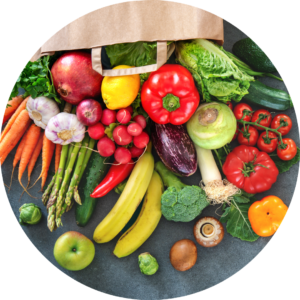Nutrition, Hydration, and Parkinson’s
Two of the most common questions we’re asked are these: “What should I know about Parkinson’s nutrition and hydration, and what should I eat now that I have Parkinson’s?” The answer is that there is no one answer. Just as each person with Parkinson’s experiences different symptoms, each person reacts differently to different types of food. The key is knowing that the foods you eat affect how you feel, and this knowledge can be a decisive first step in finding more ways to live well.
In this collection of resources, we look at some of the latest research on eating well for Parkinson’s, advice from experts, common questions we’re asked about nutrition, and more.
Click here to explore more Parkinson’s Topics.

Parkinson’s Nutrition for Living Well Today with John Duda
Nutrition continues to be one of the most important aspects of treatment for people living with Parkinson’s. The challenge is sifting through all of the available information about dietary guidelines and “ideal nutritional plans” to find what works best for each person. In this webinar, Dr. John Duda addresses how dietary choices can affect symptom control in Parkinson’s; how particular foods and timing of meals may interfere with Parkinson’s medication; how age, progression of Parkinson’s, and history can affect the efficacy of certain dietary choices; and much more.
Can a Plant-Based Diet Affect the Development, Management, and Progression of Parkinson’s?
While there is no one-size-fits-all nutritional plan for Parkinson’s, increasing evidence suggests that a particular way of eating may impact the development, progression, and management of Parkinson’s. It’s the same way of eating that has been proven to reduce the risk of diseases such as cardiovascular disease, hypertension, diabetes, obesity, intestinal problems, stroke, and cancer. It has been shown to boost energy and promote heart and brain health. And it is also recommended by countless Parkinson’s experts. So, what is it? A plant-based, whole-foods eating plan. Learn all about how this type of eating can help you live well with Parkinson’s now and into the future.
Why You Must Drink Water With Your Parkinson’s Medications
In this short video, movement disorder specialist Dr. Cherian Karunapuzha explains how drinking a glass of water when you take your levodopa helps “flush” the medicine from your stomach to your small intestine, where it is absorbed. Drinking a glass of water and taking your levodopa on an otherwise empty stomach will ensure that more of the medication is absorbed, giving you the full benefit of the levodopa.
Nutrition and Parkinson’s: An ambassador Conversation
In this conversation from The Victory Summit® Virtual Event: How to Live Well with Parkinson’s, Davis Phinney Foundation Ambassadors Marty Acevedo (a retired Registered Dietician) and Edie Anderson discuss how eating well helps them live well with Parkinson’s.
The 17 Most Commonly Asked Questions about Parkinson’s Nutrition
In this Q&A, we offer answers to some of the most common questions we receive about Parkinson’s and nutrition.
Explore More Resources About Nutrition and Parkinson's
- How Nutrition Can Help Your Anxiety
- Medication, Protein, and Parkinson’s
- How to Take Levodopa for Parkinson’s
- The Most Important Fact to Know about Parkinson’s Nutrition
- How to Experiment with your Nutrition while Living with Parkinson’s
- How to Stock Your Fridge, Freezer, and Pantry to Live Well with Parkinson’s
- Parkinson’s Cooking with Pantry Staples
- 8 Homemade, Dentist-Approved Snacks
- Stabilize Blood Sugar to Combat Fatigue in Parkinson’s
- The Science of Parkinson’s Constipation
- 5 Myths about Supplements and Parkinson’s





